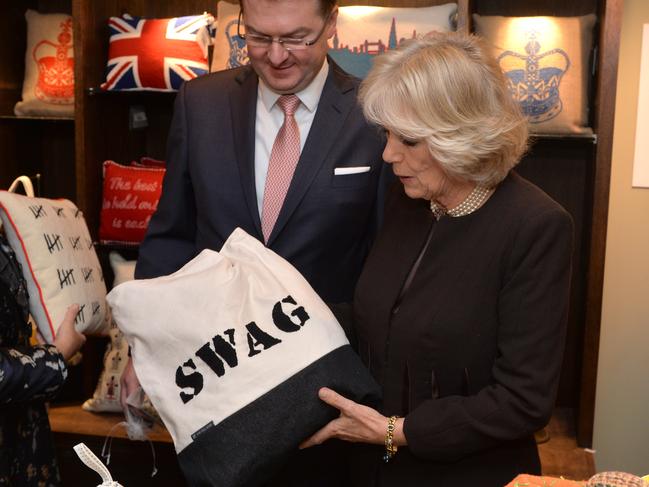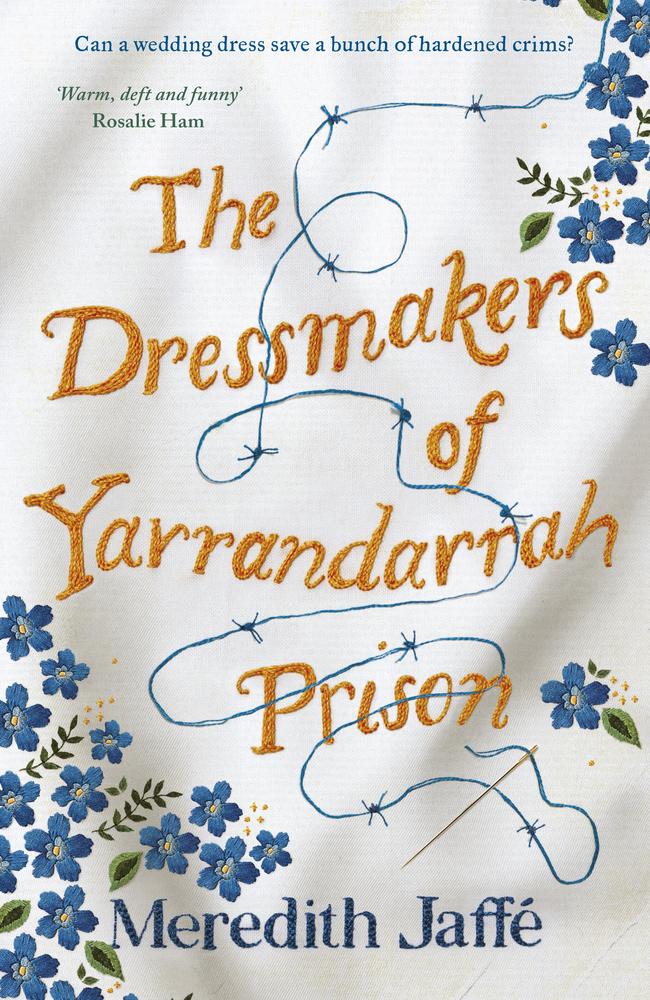Meredith Jaffe on how jail needlework project sparked her new novel
An extraordinary project with high-profile supporters is changing the lives of male prisoners — and it starts by teaching them to sew.

Books
Don't miss out on the headlines from Books. Followed categories will be added to My News.
Sewing has been a part of my life ever since I can remember. Maybe you’re picturing me knitting by a cosy fireside, or perhaps my grandmother bent over her hoop working on her cross-stitch or adding a spot of embellishment to some cloth napkins. Nothing could be further from the truth.
When I was very young, my mother set up a business from the garage under the house, sewing curtains. The sewing workroom was so small that the workbench took up almost the entire space. Once, when I went to the garage to see my mother, I put my hand on the bench and a hot iron tipped over and landed on it. I wear the scar to this day.

In our next house, the workroom occupied a light and airy room that would later be converted into a snooker room with a three-quarter-size table, so Dad could practise his game before the lunchtime tournaments in the executive dining room at Grace Bros on Broadway. The sewing business then became three rooms above shops in suburban Dee Why, after which it expanded again into a factory space in Brookvale.
By this time, Mum didn’t just make curtains, although there were still plenty of those. There were also pelmets and swags, cushions and bedheads, tiebacks and roman blinds. Over the years, I learned how to make weight bags and hand-sew pinch pleats. How to measure and cut fabric, iron the finished product, and package it up for delivery. There was always a job to do, always a beautiful fabric to admire.

The women who worked alongside Mum were clever stitchers. In their spare time, they quilted, crocheted and made stuffed toys. One day, when I was much older, I stood on one of those workbenches while these wonderful women measured and pinned and fussed over my wedding dress.
It was a lifetime ago. The dress outlasted the marriage. My mother has long since retired from the curtain-making business. No doubt the “girls” who worked for her have retired too. But the memory has remained nestled in the back of my mind.
Fast forward to 2014. I was preparing to interview actor and writer Esther Freud (daughter of the famous artist Lucian Freud and great-granddaughter of Sigmund Freud) about her new novel Mr Mac and Me, for a weekly book column for online women’s magazine The Hoopla. During my research, I discovered a series of articles Esther had written about the British charity Fine Cell Work. Their volunteers go into prisons across the UK and teach the men (because prison populations are, like here, predominantly male) fine needlework skills and quilting. The men are paid for this work and the finished product ends up in “top shops”, to quote Fine Cell Work founder, Lady Anne Tree.

As I read Esther’s article and admired the beautiful cushions and quilts illustrating the story, excitement fizzed through my veins. My first thought was, “What if one of these blokes decided to make his daughter’s wedding dress?” Past and present collided. The seed was planted and would eventually grow into my novel The Dressmakers of Yarrandarrah Prison.
Fine Cell Work demonstrates the enormous power of social enterprise. Through their vision, they have created a vehicle where men can learn skills they can later use in the outside world. The men in the program develop financial independence, improve their self-esteem, gain better anger management skills, and can dream of a different future. Stitching helps fill the long hours alone in their cells, but it also instils hope. Through the gentle art of stitching, the men’s work proves that things of beauty can come from dark lonely places.
The men’s handiwork hangs in the Victoria and Albert Museum and Buckingham Palace. Those “top shops” still sell their fabulous cushions, and top designers collaborate with them to create new works. Fine Cell Work has continued to grow since 2014 and now has a post-prison outreach program, Open the Gate, providing apprenticeship opportunities upon the men’s release.
Esther Freud is a patron and her play, Stitchers, about Lady Anne Tree’s efforts to establish the charity, premiered in 2020. American writer Tracy Chevalier (author of The Girl with the Pearl Earring and The Last Runaway) is also a patron. After delivering a talk about quilting to the men in Wandsworth prison, Chevalier conceived of the Sleep Quilt project. The 63 squares of the Sleep Quilt explore the prisoners’ relationships with and thoughts about sleep, and has resulted in a book of the same name.
Sadly, the only equivalent to Fine Cell Work in Australia is in the pages of my novel. Like its real-life counterpart, Connecting Threads brings meaning and purpose to lives through stitching, and seeks to prove that the men are more than the sum of their crimes. Like Fine Cell Work, Connecting Threads is ultimately about inspiring hope. And what greater symbol of hope can there possibly be than a wedding dress?
The Dressmakers of Yarrandarrah Prison by Meredith Jaffe, published by HarperCollins, is out now. Our Book of the Month is The End Of Men by Christina Sweeney-Baird. Head to Booktopia and enter code ‘END’ at checkout to receive 30% off the RRP of $29.99. And come find us at the Sunday Book Club Group on Facebook.


